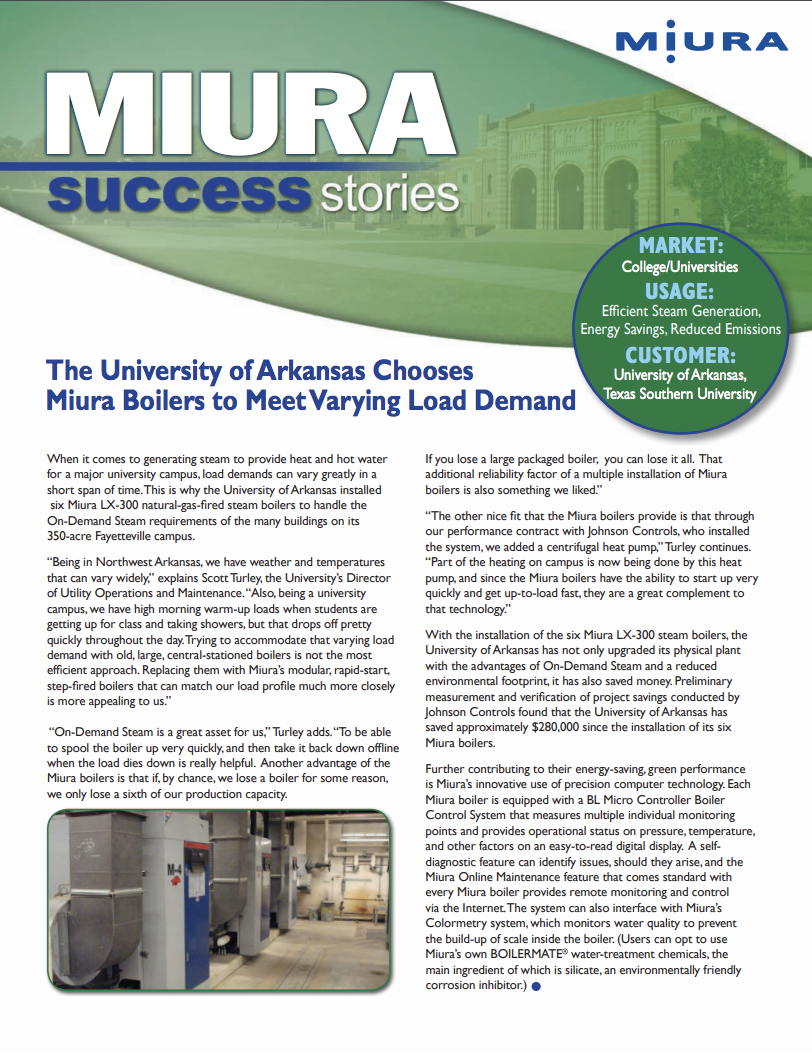Between the frequently changing weather conditions in Northwest Arkansas and the daily needs of a sizable student body, the University of Arkansas can experience huge fluctuations in its demand for steam and hot water over the course of several hours. Since its recent switch to on-demand steam delivery through the installation of six Miura LX-300 natural gas boilers, the school reports energy savings in the hundreds of thousands of dollars so far.
[READ FULL CASE STUDY]
 According to Scott Turley, the Director of Utility Operations and Maintenance for the university, temperatures can vary widely over the course of a day, which impacts the moment to moment demands for steam heat. Additionally, load demands are quite high in the morning when students are showering before classes, but drop off significantly as the day progresses. “Trying to accommodate that varying load demand with old, large, central-stationed boilers is not the most efficient approach,” he explains. “Replacing them with Miura’s modular, rapid-start, step-fired boilers that can match our load profile much more closely is more appealing to us.”
According to Scott Turley, the Director of Utility Operations and Maintenance for the university, temperatures can vary widely over the course of a day, which impacts the moment to moment demands for steam heat. Additionally, load demands are quite high in the morning when students are showering before classes, but drop off significantly as the day progresses. “Trying to accommodate that varying load demand with old, large, central-stationed boilers is not the most efficient approach,” he explains. “Replacing them with Miura’s modular, rapid-start, step-fired boilers that can match our load profile much more closely is more appealing to us.”
The dividends are already astounding. According to preliminary measurements, the UofA has saved upwards of $280,000 so far in energy bills.
Efficiency Responding to Demand
Several factors have come into play to contribute to the University of Arkansas’ energy savings since installing Miura boilers. These include:- Unique, cold-start design — Unlike conventional boilers that may require hours’ worth of natural gas to heat up, Miura boilers are designed to go from a cold start to full steam production in 5 minutes, thereby consuming far less fuel and water.
- Step-fired configuration — Miura boilers have a modular design which allows them to be installed in series. Boilers are activated in sequence as load demand increases and can be shut down as demand drops, thereby increasing energy efficiency significantly.
- Computerized monitoring to maximize efficiency — A BL Micro Controller Boiler Control System installed on each Miura boiler provides real-time information on pressure, temperature and other operational data which can be monitored from several remote points or by online access to ensure proper operation.
Additional Benefits
The University of Arkansas has seen several additional advantages with the installation of its Miura boiler system. For example:- Self-diagnostic features provide maintenance alerts, reducing downtime and the need for repairs. Miura boilers are equipped with self-diagnosis technology that monitors the performance of the equipment, the quality of the water and other factors. Engineers can be alerted immediately of any potential issues, often before they cause a shutdown.
- Modular configuration increases overall reliability. Having six smaller units in place of fewer larger ones means steam production remains largely in place if a unit goes down. “If, by chance, we lose a boiler for some reason, we only lose a sixth of our production capacity,” explains Turley. This feature is exceptionally important when meeting the heat and hot water needs of multiple buildings across a 350-acre campus.
Significant energy savings, greater efficiency, greater reliability, a smaller carbon footprint and the ability to adapt to changing load demands. These, along with savings of over a quarter million dollars so far, have only reinforced the notion that the installation of Miura boilers has been a profoundly successful investment for the University of Arkansas — not just for its own future but also for the environment.




